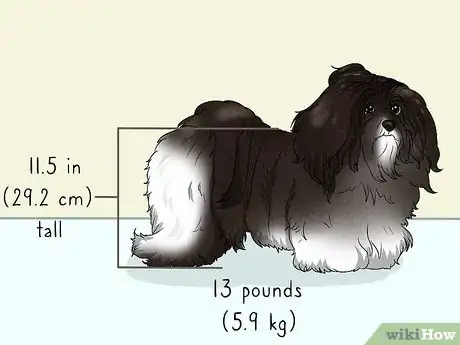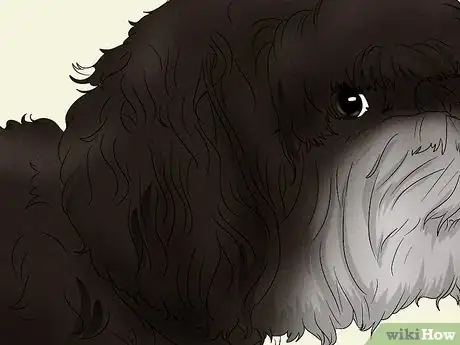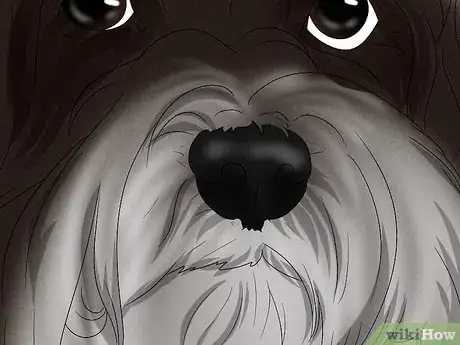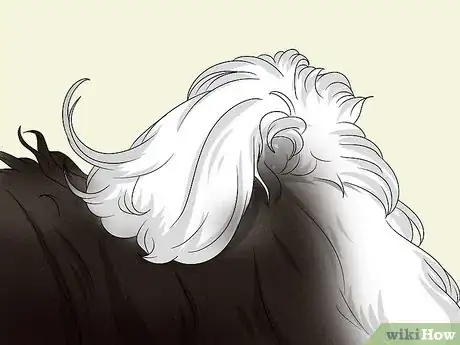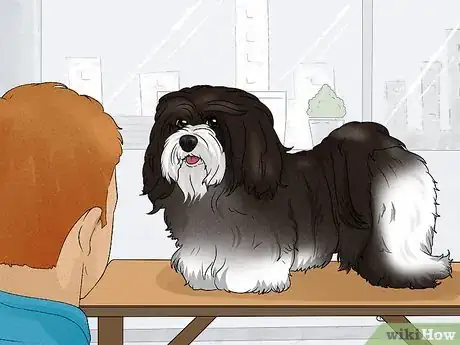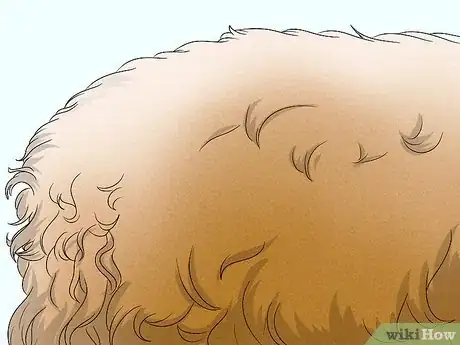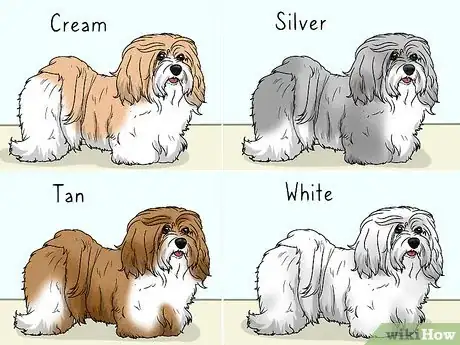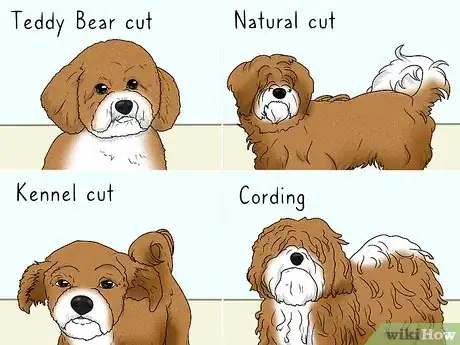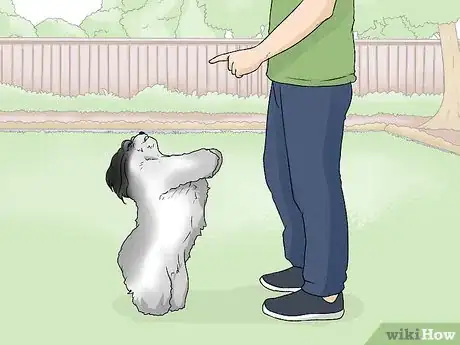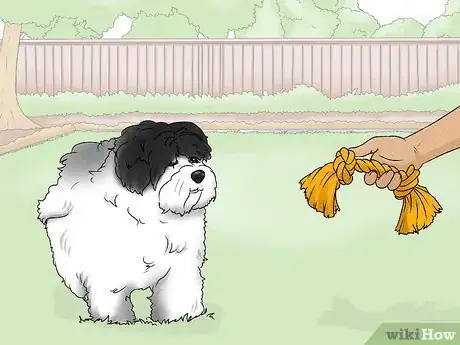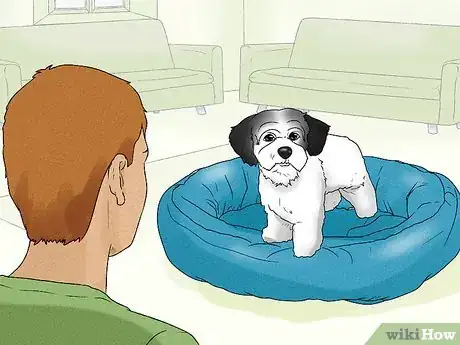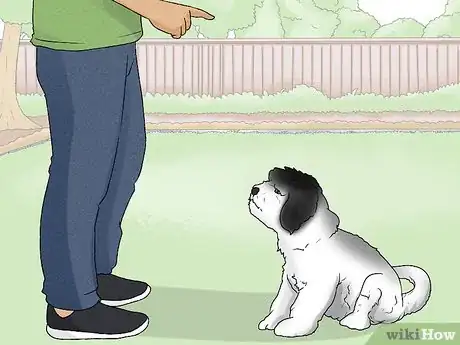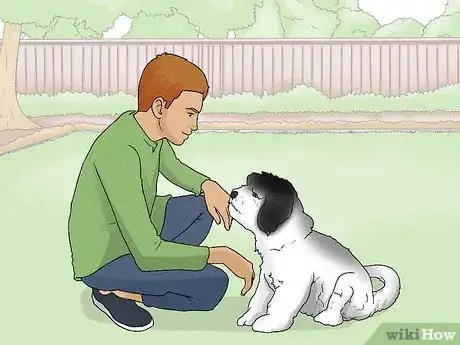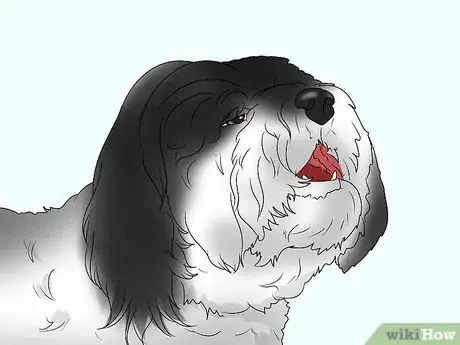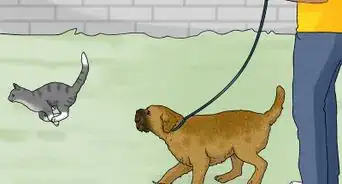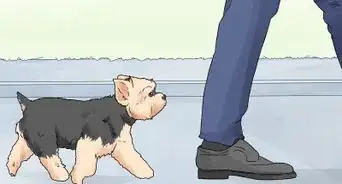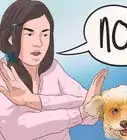wikiHow is a “wiki,” similar to Wikipedia, which means that many of our articles are co-written by multiple authors. To create this article, volunteer authors worked to edit and improve it over time.
This article has been viewed 13,602 times.
Learn more...
Havanese are small dogs with a silky coat, which can be corded like a Puli.[1] They are a member of the toy group and are known for being funny and outgoing.[2] The Havanese share traits with other dogs such as the Puli, but by recognising their key traits, it can be much easier to identify one. This wikiHow will help you know whether or not a dog is a Havanese.
Steps
Taking Notice of Body Structure
-
1Check the dog's size. Havanese are rather small dogs. They are only 8.5–11.5 inches (21.6–29.2 cm) tall and weigh 7–13 pounds (3.2–5.9 kg).[3]
-
2Look at the eyes. The Havanese have large, dark brown eyes which are almond-shaped. The eyes have solid black rims. Chocolate-coloured dogs may have slightly lighter eyes and brown eye rims instead of black.[4]Advertisement
-
3Inspect the ears. Havanese have broadly-based ears which are set high on the head. When the dog is alert, the ears will lift at the base but always remain folded.[5]
-
4Notice the muzzle. A Havanese's muzzle is slightly less in length than the skull, and it is full and rectangular with a broad nose. The dog's nose and lips are a solid black except for in chocolate coloured dogs, in which they have a solid brown pigment.[6]
-
5Examine the tail. Havanese have tails which are set high and arch forward up, over the back. The tail is plumed with long silky hair. The tail plume can either fall forward or to either side of the body, and whilst the dog is standing the tail might be dropped.[7]
-
6View the overall structure. The Havanese has a slightly arched neck, and the body is slightly longer than the height at the withers. The top of the shoulder blades lie in at the withers, allowing the neck to blend smoothly into the back. They have muscular hind legs with a moderate amount of angulation.[8]
Recognising the Coat
-
1Check the coat's texture and appearance. A Havanese has a coat which is silky and light in texture on both the outer and undercoat, although the outercoat carries more weight. The coat is long, abundant and wavy, standing off the body slightly but flowing with movement.[9]
Did you know? The Havanese's coat looks as though it would be warm, when in reality it's an insulation and barrier from the sun and overheating.[10]
-
2Take notice of the coat colour. A Havanese can be any colour, but there are some colours that are seen more frequently. These standard colours include: black, chocolate, cream, fawn, gold, red, silver, and white.[11] They can also have any type of marking, but the most standard colours of markings are: cream, silver, tan, and white.[12]
-
3Look at the 'cut'. Some people choose to give their Havanese specific haircuts rather than just leaving it as the standard cut. Some of these cuts may include the Teddy Bear cut, the Kennel cut, the Natural cut, Cording, and the Puppy cut.[13]
- The Teddy Bear cut appears as the same length all over (usually around 3 inches) apart from the head, where the hair is fluffy and cut in a rounded shape.[14]
- The Kennel cut is seen as clipping the hair much shorter all over.[15]
- The Natural cut is a long, wavy cut which has been left to grow all over.[16]
- Cording seems similar to human dreadlocks, and their hair naturally develops into cords if left long enough.[17]
- The Puppy cut is seen as cut to the same short length all over (usually 1–2 inches).[18]
Checking Temperament
-
1Watch for affection. Havanese are affectionate dogs and love more than anything to be around their people.[19]
-
2Notice playfulness. A Havanese is a playful and funny little dog. They'll love to play games like hide and seek with items around the house. The Havanese is often the family clown; they love making you laugh and being the centre of attention.[20]
-
3See how companionable the dog is. The Havanese is a gentle, peaceful dog, but is also not one that can be left alone for a long time.[21]
-
4Look for responsiveness. Havanese are very responsive dogs who will listen to their owner's commands because they want to please them. They'll learn tricks quickly because of this intelligence and desire to please their owners. Unlike some other breeds, their intelligence doesn't give them a sense of superiority, and they won't try to dominate you during training.[22]
-
5Pay attention to how sociable the dog is. The Havanese loves their owners, but will also become friends with other people, dogs, and pets. They are great with children, and children tend to love them because of how playful they are.[23]
-
6Notice barking. The Havanese tends to bark at every little sound, which can become quite annoying. If you acknowledge the barking, to make sure that everything's alright, the dog will generally quiet down. They will alert you when someone is coming and greet them happily when they arrive.[24]
References
- ↑ https://www.akc.org/dog-breeds/havanese/
- ↑ https://www.akc.org/dog-breeds/havanese/
- ↑ https://www.akc.org/dog-breeds/havanese/
- ↑ https://images.akc.org/pdf/breeds/standards/Havanese.pdf
- ↑ https://images.akc.org/pdf/breeds/standards/Havanese.pdf
- ↑ https://images.akc.org/pdf/breeds/standards/Havanese.pdf
- ↑ https://images.akc.org/pdf/breeds/standards/Havanese.pdf
- ↑ https://images.akc.org/pdf/breeds/standards/Havanese.pdf
- ↑ https://images.akc.org/pdf/breeds/standards/Havanese.pdf
- ↑ https://www.akc.org/dog-breeds/havanese/
- ↑ https://www.akc.org/dog-breeds/havanese/
- ↑ https://www.akc.org/dog-breeds/havanese/
- ↑ https://www.rover.com/blog/top-havanese-haircut-styles/
- ↑ https://www.rover.com/blog/top-havanese-haircut-styles/
- ↑ https://www.rover.com/blog/top-havanese-haircut-styles/
- ↑ https://www.rover.com/blog/top-havanese-haircut-styles/
- ↑ https://www.rover.com/blog/top-havanese-haircut-styles/
- ↑ https://www.rover.com/blog/top-havanese-haircut-styles/
- ↑ https://www.akc.org/expert-advice/lifestyle/6-reasons-to-love-the-havanese/
- ↑ https://www.dogtemperament.com/havanese-temperament/#Get_to_Know_the_Delightful_Havanese_Temperament
- ↑ https://www.dogtemperament.com/havanese-temperament/#Get_to_Know_the_Delightful_Havanese_Temperament
- ↑ https://www.dogtemperament.com/havanese-temperament/#Get_to_Know_the_Delightful_Havanese_Temperament
- ↑ https://www.dogtemperament.com/havanese-temperament/#Get_to_Know_the_Delightful_Havanese_Temperament
- ↑ https://www.dogtemperament.com/havanese-temperament/#Get_to_Know_the_Delightful_Havanese_Temperament
